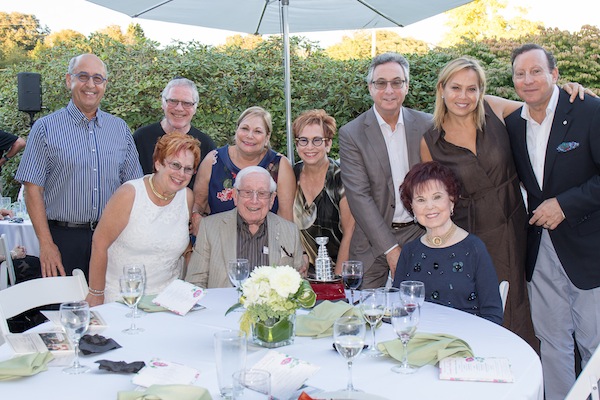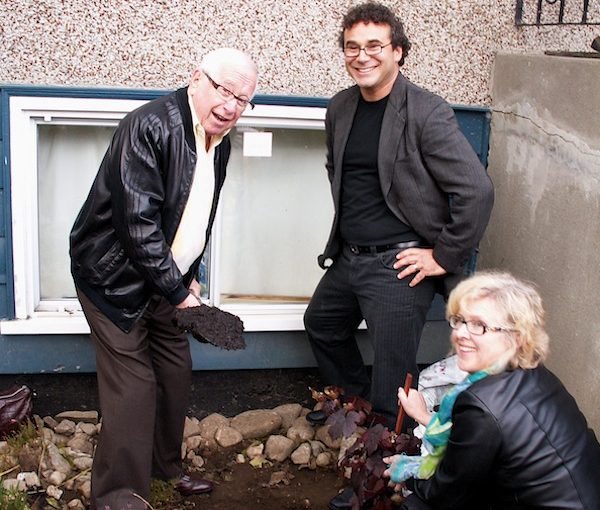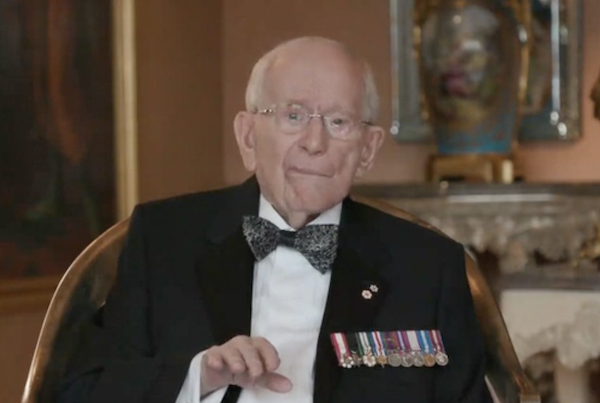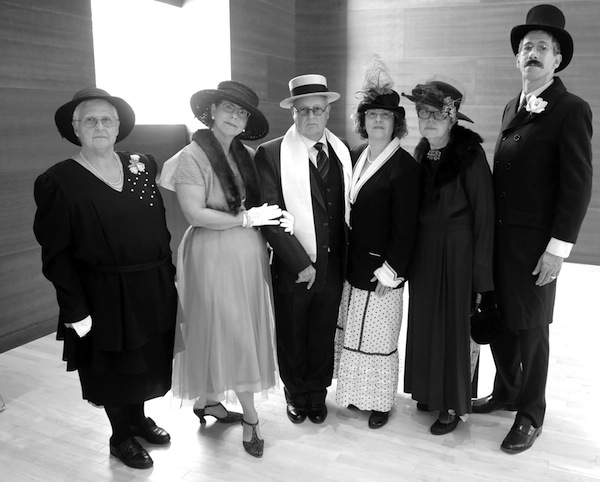Joseph and Rosalie Segal (seated) and family at the 2016 Summer Garden Party fundraiser for Vancouver Hebrew Academy. (photo by Jocelyne Hallé)
Joseph Segal, an entrepreneur and philanthropist who was recognized by the governments of British Columbia and Canada with the highest civilian honours, a Second World War veteran who helped liberate the Netherlands, a businessman who founded and led iconic companies and a community-builder whose imprint on the Jewish and general communities in Vancouver is indelible, passed away May 31. He was 97 years old and was actively engaged in philanthropy to his final hours.
Segal was born in 1925, in Vegreville, Alta. After the death of his father, when Joe was 14, the family experienced financial hardship and young Joe Segal experienced hard labour while building the Alaska Highway. He fought in the infantry in the Second World War where, with his compatriots in the Calgary Highlanders, he participated in the liberation of the Netherlands.
After the war, he arrived in Vancouver and, with $1,500 in savings, started selling war surplus goods, then founded Fields department stores. Eventually, his business took over the Zellers store chain – which Segal described as “a case of the mouse swallowing the elephant” – and, later, obtained a large share of the venerable Hudson’s Bay Company before he launched Kingswood Capital Corp., which has interests in real estate, manufacturing and finance.
In recent years, while lauded for his business acumen, Segal was most prominent as one of Canada’s leading philanthropists. For his work in both fields, he was a recipient of both an Order of Canada and an Order of British Columbia.
In addition to leaving his mark on a vast number of institutions and causes in the Jewish community, he was a strong supporter of charities such as Variety Club, the United Way, Vancouver General Hospital and B.C. Children’s Hospital.
Among his community roles was serving on the board, and as chancellor, of Simon Fraser University. Perhaps his most visible contribution in Vancouver was his donation to SFU of the historic Bank of Montreal building at 750 Hastings St., creating a home for the Segal Graduate School of Business.
In 2010, Joseph and his wife Rosalie donated $12 million to the VGH and UBC Hospital Foundations to create the Joseph and Rosalie Segal and Family Centre, a 100-private-room acute care centre serving the mental health needs of people in crisis.
Joseph and Rosalie Segal modeled philanthropy for the successive generation of their family, including children Sandra, Tracey, Gary and Lorne, their spouses and, now, grandchildren and great-grandchildren.
At Joe Segal’s funeral on June 1, Gary Segal reflected on his parents’ 74 years of marriage, calling it “a love story for the ages.”
“My father worshipped my mother, he relied on her support and wisdom and insights,” he said. “They were true partners in everything they did and accomplished in life.”
Gary Segal called his father “a natural-born philosopher, a generous man, caring. He would never forget anything or anybody. He was passionate about life. He had many dreams – his own and those that inspired others. He had the ability to talk to people and make everybody, no matter what stage in life, feel important, like they mattered, that somebody cared about them.”
Although he knew the impact that his father had had on the world and the people in it, “to see these genuine expressions of sorrow and appreciation for the person my father was has been truly extraordinary for me and for my family.”
He shared three core tenets of his father’s philosophy:
• Don’t worry about what you can’t control, worry about what you can.
• You need to commit to life and you need to commit to happiness.
• Money is only worth something if you do something good with it.
Gary Segal quoted actor John Barrymore, who said, “You’re never old until regrets take the place of dreams.” In that respect, said Segal, although his dad lived to 97, “My father was not old. He never aged. Right up to the last minute, he was young. He was always young at heart, in spirit, and right up to the end, he had his dreams.”
Longtime friend and book collaborator Peter Legge reflected on a half-century of friendship after the pair met when Legge was an adman at radio station CJOR.
“Joe was a man who shared all he could with those who needed help,” said Legge. “Never to lift himself up, but to lift up those who needed help.”
Rabbi Yitzchok Wineberg noted that some people are saying the passing of Joe Segal is the end of an era.
“I beg to differ,” said the city’s longest-serving rabbi and Chabad emissary. “Joe didn’t live his life for himself or for himself and Rose. He lived his life for his children, for his grandchildren, for his great-grandchildren. They were there to observe everything he did and be inspired by it…. This family will continue his legacy. It’s not the end of an era, it’s a milestone. It’s a date that we all know we are going to have to face one day and, especially at such a funeral, we think about our own mortality. But it’s not just what you’ve accomplished in your lifetime. It’s what’s going to be accomplished after you leave this world. For that reason, I feel it’s not the end of an era. It’s just a continuation, and God should help that we should celebrate many happy occasions together in the future and we should be there for one another just as Joe was there for everybody else.”
Rob Schonfeld, a grandson, said that it may sound strange to be shocked that a 97-year-old man has passed away.
“But Grandpa Joe was so larger-than-life and still 100% on his game,” he said. “None of us really internalized that this day was going to come.”
Of Segal’s 11 grandchildren and 18 great-grandchildren, Schonfeld said: “We all had really unique and different relationships with him. None of them was the same and it’s because he always treated us as individuals. He respected us as grown-ups – even when we were little kids. I think that allowed each of us to bond with him in really different ways.”
Schonfeld shared one of his favourite “Joe-isms” – “You can’t ride two horses with one ass” – and said Segal’s secret weapon was “reading everything in sight.”
Rabbi Andrew Rosenblatt of Congregation Schara Tzedeck compared Segal with the biblical Joseph. The moment before the Exodus, the rabbi observed, Moses was looking for the bones of Joseph to carry with the Israelites to the Promised Land.
“He’s fulfilling a promise, granted, but it’s more than that,” said Rosenblatt. “Moses needs a symbol of what it means to succeed materially in this world and to succeed with others. Joseph is that symbol. He is a symbol of somebody who can have material success and can have spiritual success as well. There are two chests that walk with the Jews through the desert. One holds the tablets that Moses brings down from Sinai and the other one carries Joseph. Our Joseph is a little like that, too. He is a lesson, a paragon, a role model, an icon. Just like the biblical Joseph, his personality, his legend, survives even him. Joe Segal will continue to be that for so many in our community.”
The rabbi remarked that he was professionally forbidden from sharing the many stories of individuals who Joseph Segal helped when called on to assist an individual or family in crisis.
Rosenblatt added that Segal specifically asked for donations in his memory to be given to Yaffa House and to the Jewish Food Bank.
The Independent spoke with some of the people who worked with and knew Segal in different capacities.
David Levi served with Segal on the board of the Phyliss and Irving Snider Foundation and is on the board of governors for Camp Miriam, one of the causes Segal championed.
“Over the years, he’s given [Camp] Miriam quite a large amount of money and he was always very supportive of giving money to the camp and the kids. It was a central focus of his,” Levi said, noting that Camp Hatikvah was another cause Segal admired.
“Joe’s view, I think, on camp in general is that it built a connection to Judaism for kids at a young age and he saw camps making that connection to the Jewish community and to Israel. Those were important things for him,” Levi said.
“The thing about Joe was his complete commitment to the community – to the Jewish community and to the larger community.” But Levi stressed that large gifts to major organizations were not the only way the legendary philanthropist operated. Echoing Rabbi Rosenblatt, Levi referred to “Joe’s secret life.”
“He would get calls not only from individuals but from rabbis and other leaders in the community on a very personal level for people who needed a hand up or needed some financial means for a brief period of time,” Levi said. “It was smaller amounts of money, but, in his mind, as important as the organizations that he worked with. People would call and say we have this family and they are really having a tough time and they need an injection of $1,000 or $500 and Joe would quietly do that. He never really talked about it. He certainly never talked about the individuals he supported. But he was always available for those kinds of emergency calls.
“He believed in hard work but he also believed that people who had difficulty in achieving the kinds of things that he would hope everybody would be able to achieve, people who are challenged by mental or physical disabilities, he would help in any way he could,” Levi said.
Bernie Simpson, who is also on the board of Camp Miriam, echoed Levi’s reflections of Segal’s support for Jewish camping.
“For over 50 years, Joe was a strong supporter of Camp Miriam,” said Simpson. “He joined the late [B.C. Supreme Court] Justice Angelo Branca, who was the chair of the finance committee of Miriam in rebuilding the camp in 1970. Fifteen years ago, Joe was responsible for the building of the camp infirmary through the Snider Foundation, honouring Joe and Rosalie Segal’s close friends Mike and Rita Wolochow.… Joe’s support of the camp policy that every child should have a Jewish camping experience, regardless of their financial means, goes back to when he was a youth himself from very humble beginnings. Several years ago, he praised the camp and its leadership for their devotion to the youth whose attendance at camp was possible through the campership fund. He will be sorely missed.”
Simpson said Segal was in frequent contact with his wife, Lee Simpson, when she was president of the board of the Louis Brier Jewish Aged Foundation, to catch up on developments at the Jewish home and hospital.
“I understand, from other organizations, he would constantly keep in touch with what was going on in the community,” said Simpson. “He looked at the big picture.”
In a message to the Independent, Vancouver Hebrew Academy (VHA) said, “Mr. Segal took his responsibility to the Jewish community very seriously and he showed it in many ways. Of course, he was a strong financial supporter of Vancouver Hebrew Academy, as he was for many of our institutions, but his advocacy went further than that. He believed strongly in Torah education and what it means to the future of the Jewish people. In the summer of 2016, Joe and Rosalie were the honourees at VHA’s Summer Garden Party. There, Joe spoke passionately and emotionally of the importance of our mission.”
Rabbi Don Pacht, VHA’s former head of school, remembers fondly the conversations with Joe Segal about the school, the community and his admiration for those who chose to dedicate themselves to building community.
“I often came away from our visits encouraged in the work we were doing,” said Pacht. “Mr. Segal always had words of wisdom to offer … and sometimes a bottle of scotch too!”
Michael Sachs, executive director of Jewish National Fund of Canada, Vancouver branch, reflected on a long relationship.
“He was a titan in the business world and a leading philanthropist to all communities, but most of all he was a family man through and through,” said Sachs. “I have many fond personal memories with Joe from my childhood up until a few weeks ago. He touched everyone in our community and I count myself amongst one of those touched.”
Segal’s legacy was celebrated and remembered outside of the Jewish community, including by many organizations that Segal, wife Rosalie and the family had collectively supported.
“Joe was an enthusiastic champion of the university,” Simon Fraser University said in marking Segal’s passing. “His advice, energy and wisdom supported eight presidents and his business savvy and connections helped SFU to thrive. His commitment to community-building and philanthropy was recognized in 1988 with a doctor of law, honoris causa, from SFU and in 1992 with the President’s Distinguished Community Leadership Award, honouring his innovation, optimism and strong sense of public service to SFU’s community.”
The VGH & UBC Hospital Foundation issued a statement honouring Segal.
“A pledge of $12 million in 2011 to initiate planning of a new purpose-built mental health facility was the largest individual donation to this cause in B.C. at the time. This commitment initiated a $28 million fundraising campaign and the construction of an $85 million purpose-built mental health facility which stands as his legacy: the Joseph & Rosalie Segal & Family Health Centre.”
It continued: “Joe never retired, and his mind and memory were sharper at 97 than many people years his junior. Until very recently, he remained active in business, working from home as was required throughout the pandemic. Similarly, he continued to support the causes he cared about, offering sage advice, wisdom and guidance. He continued to support VGH and UBC Hospital’s most innovative clinician-researchers and surgeons, kicking off a campaign in support of the Vancouver Stroke Program and seed-funding research for innovative medical talents, as well serving as the honourary chair of the Brain Breakthroughs Campaign.”

Coast Mental Health declared Segal “B.C.’s most significant supporter of mental health services.” His devotion to the cause began in 1999, when he first attended the Courage to Come Back Awards, where he heard people share personal stories of living with mental health and emotional challenges. His devotion to the cause was born out of a belief that no one is immune from the detrimental effects that mental illness can have if not properly treated.
Lorne Segal has chaired the Courage to Come Back Awards for the past 17 years, and the family as a whole has championed the cause.
Shirley Broadfoot, the founding chair of Courage to Come Back, recalled meeting Joe Segal for the first time.
“He was inspired by the power of the evening but said, ‘You really don’t know how to fundraise.’ It was true. We didn’t. So his son, Lorne, took on the role of chair for Courage and all that changed. Through Lorne’s leadership, Courage has risen to be the largest event in Vancouver. We could never have imagined that the awards would flourish and go on to give hope to people for 24 years, including through a global pandemic, while raising over $22 million and honouring 139 heroic British Columbians,” she said.
Coast Mental Health chief executive officer Darrell Burnham added: “Joe Segal was an incredible leader who gave so much to the community of Vancouver. I met Joe in the ’90s, and I was so pleased when he chose mental health as one of his philanthropic causes. Joe knew everyone in the city. He also had the charisma to engage other philanthropists in social causes that needed visibility and support. When Coast Mental Health Foundation and the Courage to Come Back Awards took shape, it was Joe Segal and his family who stepped up to provide financial assistance to support Coast Mental Health.”
Ezra Shanken, chief executive officer of Jewish Federation of Greater Vancouver, said Segal “was not only a titan in the business and philanthropic worlds, but a genuinely caring and compassionate person – a true mensch. He is among a generation of leaders who helped shape our Jewish community.… Joe was a steadfast supporter of countless worthy causes both within and beyond our Jewish community, including the work of our Federation and our partners. We are deeply grateful to him for his incredible generosity over the decades.”






